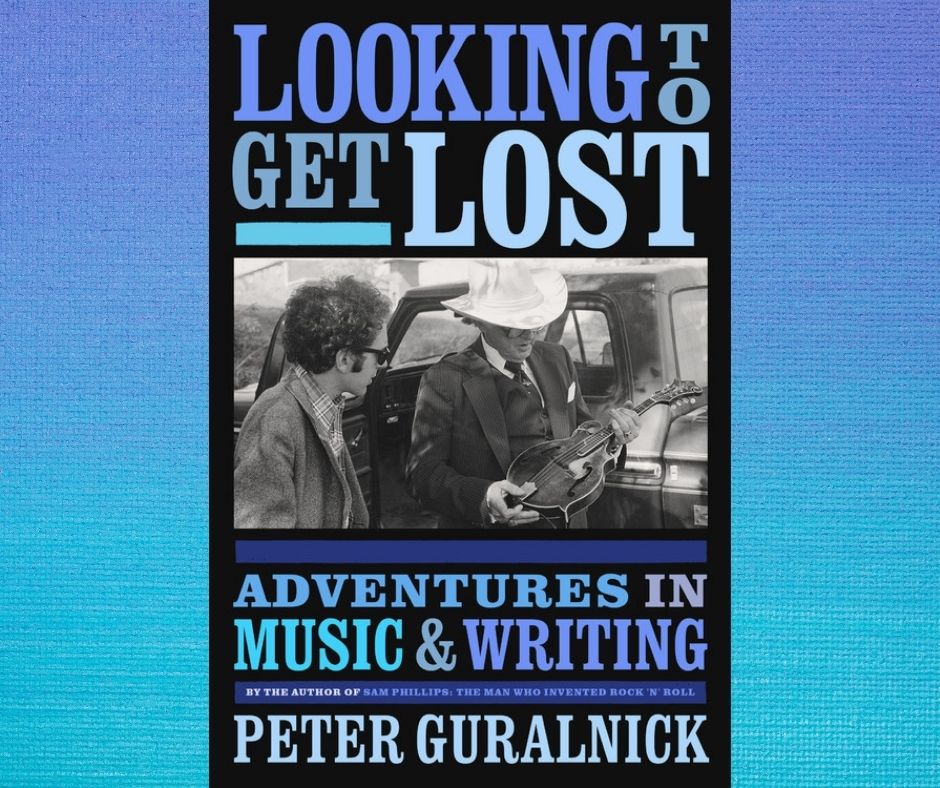THE READING ROOM: Music Writer Peter Guralnick Offers Glimpse into His Craft

The best way to review one of Peter Guralnick’s books is simply to listen to his words. He’s a mesmerizing storyteller who captures the reader’s attention not only with the details of the stories of the musicians he’s met, interviewed, and written about, but also with the curiosity and passion of a fan. He’s as taken with his moments in the presence of Tammy Wynette, Jerry Lee Lewis, or Solomon Burke as any fan would be, and he always on the lookout for those moments in which an artist’s creativity reveals itself and the ways that these artists express themselves: “[W]hat always fascinated me, apart from the very idiosyncratic nature of each and every person that I’ve ever written about, was the imaginative impulse that drove them all, not the material dreams … but what it was in their makeup that led them to express themselves in so particular and individuated a manner.”
Guralnick’s new book of profiles, Looking to Get Lost: Adventures in Music & Writing (Little, Brown), offers captivating glimpses into the life and music of artists including Skip James, Robert Johnson, Willie Dixon, Chuck Berry, and Eric Clapton. Of course, we have come to expect such intriguing and detailed writing about music from Guralnick, whose books include Sam Phillips: The Man Who Invented Rock ‘n’ Roll, Dream Boogie: The Triumph of Sam Cooke, Last Train to Memphis: The Rise of Elvis Presley, and Careless Love: The Unmaking of Elvis Presley. In each, he paints colorful portraits of his subjects based on meticulous research, both archival and personal, and they also reveal Guralnick’s own emotional investment in them.
But Looking to Get Lost: Adventures in Music & Writing is such a treat because it’s not only about music; the book gives us a glimpse at Guralnick the writer and Guralnick the reader and comes as close as we’re likely to get to something like an autobiography. Some of the best profiles — on novelists Lee Smith and Henry Green — are the ones that, glancing at the table of contents, seem out of place amongst those on Howlin’ Wolf, Ray Charles, Johnny Cash, and Merle Haggard, among others. What connects these pieces is Guralnick’s creativity, his love of getting lost in a story or a song, and his desire to write.
In a very plainspoken manner, Guralnick declares: “[S]imply put, this is a book about creativity. Like so many other things in my life, this is a realization I have come to only after the fact.”
Guralnick then goes on to reflect how he’s come to where he is now: “I could act as if I don’t really know how it happened, but it wouldn’t be true. I know exactly how I got to this place, whether for good or for ill, and I can’t pretend otherwise. I wanted to be a writer. Not a rock writer — there was no such thing. I wanted to write novels and stories. And so I did — and occasionally still do. When I was fifteen, I first read the Paris Review interview with Ernest Hemingway in which he spoke of his working methods, and I took note of the fact that he set himself a quota of something like 500 words a day. With as much self-doubt as temerity, I did the same, committing myself to the idea that should inspiration ever deign to visit I was not going to be absent from my post. And so I began a daily vigil that has persisted more or less to this day.”
At the same age he fell in love with the blues. “It was like the writing of Italo Svevo or Henry Green: it just turned me around in a way that I am no more inclined to quantify or explain today than I was then. But I never dreamt of writing about it. There was nowhere to write about it in. And besides, I’m not sure I could have imagined a way in which to truly evoke just what I was feeling at the time. Experience, don’t analyze, my inner voice told me.”
Getting lost in the music strives with Guralnick’s passion to tell the world about it and about his experience of it: “I wanted to proclaim Muddy Waters’ and Bo Diddley’s genius, I wanted to find some way to describe the transcendent drama of the rhythm and blues revues that I had witnessed, featuring astonishing performances by such virtuosic entertainers as Solomon Burke, Otis Redding, Joe Tex, and Little Richard, sometimes on the same bill.”
As he looks back on his life of writing about music and his passion for writing, he recognizes that while you can’t rekindle the simple enthusiasm you might have at 15 for a musician or a writer, you can nevertheless get lost in the beauty or ingeniousness of it. “What other hope is there except in surrender, whatever indignities surrender may entail?” he writes. “So in the end that is my advice: surrender to the music. That is what I hope the underlying message of my writing to be. Surrender to Sam Cooke and Bob Dylan and Sleepy LeBeef, and the Mighty Clouds of Joy. We are all just looking to get lost.”
So, surrender to Peter Guralnick; get lost in his expressive fan’s notes and appreciations and candid reflections on Ray Charles, Doc Pomus, Colonel Parker, Henry Green, and Chuck Berry. In fact, surrender to the closing section of the book, which he titles “A Fan’s Notes,” long narrative reflections on sources, many of which are mini-profiles in themselves.
Guralnick learned from his grandfather “that everything is just out here waiting to be discovered.” After a few hours of getting lost in Looking to Get Lost: Adventures in Music & Writing, you’ll discover just how much there is still to be discovered about some of your favorite musicians.




